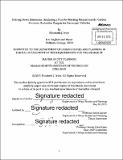| dc.contributor.advisor | Judith Layzer. | en_US |
| dc.contributor.author | Irvin, Elizabeth J. (Elizabeth Joanna) | en_US |
| dc.contributor.other | Massachusetts Institute of Technology. Department of Urban Studies and Planning. | en_US |
| dc.coverage.spatial | n-us-ma | en_US |
| dc.date.accessioned | 2015-09-29T19:03:16Z | |
| dc.date.available | 2015-09-29T19:03:16Z | |
| dc.date.copyright | 2015 | en_US |
| dc.date.issued | 2015 | en_US |
| dc.identifier.uri | http://hdl.handle.net/1721.1/99099 | |
| dc.description | Thesis: M.C.P., Massachusetts Institute of Technology, Department of Urban Studies and Planning, 2015. | en_US |
| dc.description | Cataloged from PDF version of thesis. | en_US |
| dc.description | Includes bibliographical references (pages 51-52). | en_US |
| dc.description.abstract | Massachusetts is one of the US states at the forefront of carbon emission reduction policy, and has the potential to model success to the rest of the country. The state's Global Warming Solutions Act (GWSA) passed in 2008, two years before federal climate legislation floundered in the U.S. Senate. This legislation committed the state to reducing carbon emissions 25% below 1990 levels by 2020 and 80% by 2050. However, progress toward these targets has been uneven, particularly when it comes to transportation and land use. Despite aggressive goals, the number of vehicle trips, the number of vehicle miles traveled (VMT), and the carbon emissions from passenger vehicle trips are all projected to increase over the next several decades. What will it take to put Massachusetts on track to meet its vehicle emission reductions targets? Many of the state's environmental advocates are uniting behind a potential new policy, a revenue-neutral carbon tax or carbon fee. This policy would levy an additional fee on fossil fuel consumption, but would distribute the revenue back to the state's residents instead of adding it to the state budget. This thesis explores the political, technical, and equity-based considerations that must be addressed to make this policy framework a success. Through spatial analysis of passenger vehicle driving patterns in the state of Massachusetts, a case study of British Columbia's successful revenue-neutral carbon tax, and analysis of the current political landscape in Massachusetts, I conclude that environmental advocates should reconsider their decision to advocate for a state level revenue-neutral carbon tax. At first glance, this policy seems elegantly workable -- economist-approved, politically savvy, and equity-conscious. A closer look, however, reveals some serious flaws that are likely to render it at best a huge expense of political capital for limited results. Worse, this policy might actually undermine the case for a nationwide carbon tax. | en_US |
| dc.description.statementofresponsibility | by Elizabeth J. Irvin. | en_US |
| dc.format.extent | pages | en_US |
| dc.language.iso | eng | en_US |
| dc.publisher | Massachusetts Institute of Technology | en_US |
| dc.rights | M.I.T. theses are protected by copyright. They may be viewed from this source for any purpose, but reproduction or distribution in any format is prohibited without written permission. See provided URL for inquiries about permission. | en_US |
| dc.rights.uri | http://dspace.mit.edu/handle/1721.1/7582 | en_US |
| dc.subject | Urban Studies and Planning. | en_US |
| dc.title | Driving down emissions : analyzing a plan for meeting Massachusetts' carbon emission reduction targets for passenger vehicles | en_US |
| dc.title.alternative | Analyzing a plan for meeting Massachusetts' carbon emission reduction targets for passenger vehicles | en_US |
| dc.type | Thesis | en_US |
| dc.description.degree | M.C.P. | en_US |
| dc.contributor.department | Massachusetts Institute of Technology. Department of Urban Studies and Planning | |
| dc.identifier.oclc | 922322194 | en_US |
